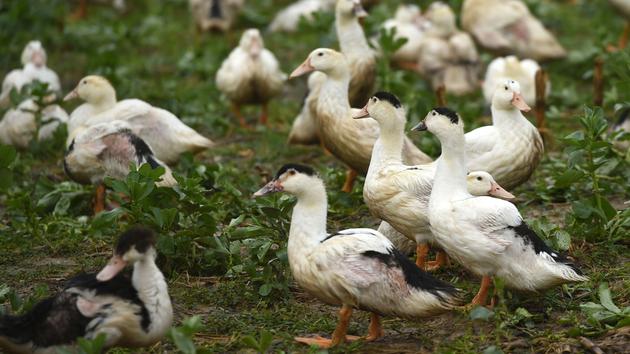After two years of respite, the H5N8 avian influenza virus, very contagious for poultry and especially ducks but not transmissible to humans, is once again wreaking havoc in the South West.
“We are on high alert because the virus is spreading very quickly.
Despite the holiday season, all the players in the sector are mobilized and determined to stop this spread,
assures Marie-Pierre Pé, general delegate of the Interprofessional Committee for Foie Gras (Cifog).
The slaughterhouse staff requisitioned to kill the contaminated ducks - 40,000 since last week - are ready to work including December 31.
Chambers of agriculture, veterinarians and State services support us in the field. ”
Read also:
Avian flu: "There is no risk of transmission" to humans, assures Denormandie
Precisely, the public authorities have just widened the perimeter of the municipalities affected by H5N8 in order to contain the spread of avian flu and prevent it from reaching the east of the Landes department and the west of the Gers where there are also many farms.
According to a decree published this Tuesday in
the Official Journal
, around a hundred municipalities located in the Pyrénées-Atlantiques but especially in the Landes, where 40% of French foie gras is produced, are now concerned by a systematic slaughter of ducks, against eleven per week. last.
“From the moment an outbreak of contamination is detected in a farm in one of these municipalities listed in the
OJ
, preventive slaughter of ducks and other poultry will systematically take place in other farms located within a radius of 3 kilometers.
On the other hand, those located beyond 3 kilometers although being in the same municipality will not be concerned if the PCR tests carried out on the ducks prove to be negative, ”
explains Marie-Pierre Pé.
Virulent epidemic
Professionals want to avoid re-traumatizing an entire industry which has already been severely affected by this scourge in the recent past.
To cope with a virulent H5N8 avian influenza epidemic, a total crawl gap of six months between the end of 2016 and the beginning of 2017 had been decided.
No less than 4.5 million ducks, including healthy ones, had thus been preemptively killed.
Since then, breeders have invested in buildings to contain ducks during the season of wild bird migrations in fall and spring.
Carriers bought trucks with protective nets that no longer let duck feathers escape, which are vectors of contamination.
The slaughterhouses have invested in washing docks where the plastic boxes containing the ducks are systematically cleaned after the animals have been deposited for the killing.
But all of these efforts do not seem to be enough.
"
I am currently on tour in Chalosse, a very dense breeding area where the virus is rampant
," notes Jean-Luc Guérin, professor at the Toulouse veterinary school, specialist in poultry farming and avian pathology.
The first contaminations probably took place by wild avifauna.
This highly pathogenic virus is spread by all means.
Confining ducks in buildings is not enough to protect them.
The current storm has helped the virus spread airborne. ”
In this context, the purchase of new ducklings for breeding is not on the agenda.
"I am luckily in annual cut for fourteen days, with empty buildings,
explains Thierry Vignolles, at the head of a breeding, with two other partners, of 72,000 fatty ducks in Perquie in the Landes, a commune of Chalosse no concerned by the new
OJ
decree
.
I already know that I will not be able to have new ducklings for the recovery in January.
Some hatcheries where I get supplies are in the control zone and cannot deliver to me as long as the virus is present. ”
At the other end of the chain, in the foie gras manufacturing companies, it is also the concern.
“We are working with affected farms.
This will reduce production and we hope to contain this scourge very quickly, ”
summarizes Fabien Chevalier, Managing Director of Lafitte in Montaut.

